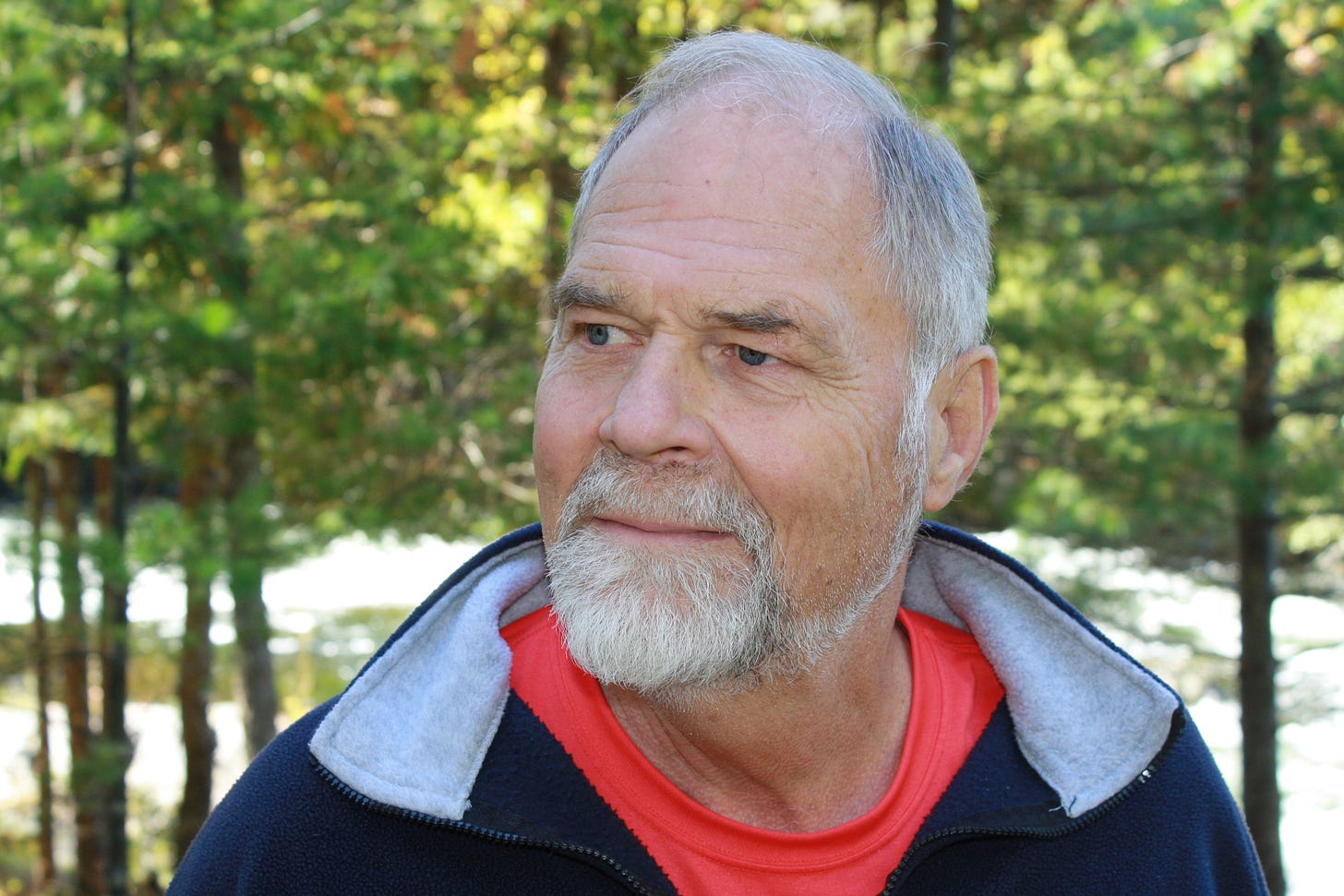In Winter, Thoughts of Hiking in August
After some setbacks, 80-year-old Sydney Lea heads right back into the great outdoors.
I’m blessed that in my corner of Vermont, I can literally step out our back door for a hike. I don’t cross even a maintained dirt road, let alone any pavement, for a long, long time, and I walk on without seeing any dwellings, either, or none beyond the ones I mentally resurrect from their ancient cellar holes. I like doing that.
Unfortunately, much has interfered with my ramblings in recent years. In 2016, a tick-borne horror called ehrlichiosis stuck me in the hospital—including time in the ICU—and made me feel sicker than I ever have in an expansive life. It took me almost a year to get my energy back. Two knee replacements followed in successive years. And then came the Covid-19 pandemic, during which I seemed until lately not to feel the usual hiking urge. I don’t know why.
The proverbial elephant in my autobiographical room, of course, is that I’m now 80. This means, for instance, that I’ll find myself looking for a stump-seat halfway up a ridge I used to charge, and I’ll wonder what on earth the problem can be. Yes, I used to charge up here!
Yet my chief motive for staying out of the warm-weather woods derives from that enervating hospital stay. Although at my doctor’s suggestion I keep two tablets of doxycycline on hand in case one of the horrid creatures embeds itself in my flesh again, I’ve remained deathly afraid of ticks ever since that ordeal.
But the proverbial elephant in my autobiographical room, of course, is that I’m now 80. This means, for instance, that I’ll find myself looking for a stump-seat halfway up a ridge I used to charge, and I’ll wonder what on earth the problem can be. Yes, I used to charge up here! There’s still an absurd interval before the light goes on: Sure, you did that when you were 50, even 70... which you aren’t anymore. I fight to repress that awareness, but there it is.
I’m utterly undeserving of anyone’s pity, I concede, least of all my own. I look around at so many friends who are lapsing into semi-incoherent senility, others who’ve been pushed even farther by Alzheimer’s, and there’s that mounting number of men and women who can’t be seen at all. I’m a very lucky man: not only can I adore my life’s partner, our five children, and all seven of our grandchildren, but I can also still bushwhack, if not with the same vigor, through the dense upper-New England woods, can paddle my canoe or kayak with some authority, what have you. And, in however stately a way, I can hike the hill trails.
I look around at so many friends who are lapsing into semi-incoherent senility, others who’ve been pushed even farther by Alzheimer’s, and there’s that mounting number of men and women who can’t be seen at all.
On winter days, I look ahead six months to late summer. Now for some, August is scarcely an ideal hiking month, especially no w that with each passing year, the climate gets soggier and hotter. On the other hand, particularly in as dry a summer as the last one, those damned ticks are largely inert, and the vicious biting insects of earlier summer have pretty much gone too. At least at the month’s beginning, the daylight hours linger long enough for me to go out early or else deep into the day, when some cool is available, to ramble around.
Needless to say, there are times Robert Frost’s passage from “Birches” does apply:
...life is too much like a pathless wood
Where your face burns and tickles with the cobwebs
Broken across it, and one eye is weeping
From a twig’s having lashed across it open.
The spiders do start getting hyperactive at that time of year, and the trees and shrubs are so laden with foliage as to obscure clear vision now and then. I can trip and fall over invisible deadfalls and holes, and sure enough, an unseen twig will occasionally stab me somewhere.
I’m a very lucky man: not only can I adore my life’s partner, our five children, and all seven of our grandchildren, but I can also still bushwhack, if not with the same vigor, through the dense upper-New England woods, can paddle my canoe or kayak with some authority, what have you. And, in however stately a way, I can hike the hill trails.
But it is exactly the abundance of foliage that appeals to me. Under the unbroken canopy, I can feel—excuse the cliché—almost as if I’m back in the putative womb, protected and safe. Or I can all but imagine myself, despite the sweat, the abrasions, and the cobwebs, having been transported to some unearthly Eden.
This foolish delusion is temporary, as it should be. Everything is cyclical, and I know that in my very bones. Frost in the same poem immediately ponders such a matter:
I'd like to get away from earth awhile
And then come back to it and begin over.
May no fate willfully misunderstand me
And half grant what I wish and snatch me away
Not to return. Earth’s the right place for love:
I don’t know where it's likely to go better
Just as the in-the-womb coziness appeals, so can delivery from it. It’s doubtless the imminence of fall and winter that starts me thinking that way. In any case, speaking for myself, that release enables me to celebrate the riches I possess, above all love, and more especially family love. Conscious as I become of their transience, I cherish all the crucial things even more deeply. As another poet, Wallace Stevens, asserted: “Death is the mother of beauty.”
I have no notion what becomes of us after the Reaper does arrive, but every so often I get an odd little inkling of continuity, of everything’s starting over, just as what we have contrived to call a year or four seasons has always done.
I have no notion what becomes of us after the Reaper does arrive, but every so often I get an odd little inkling of continuity, of everything’s starting over, just as what we have contrived to call a year or four seasons has always done.
Here’s a bizarre example. For the better part of a decade, I couldn’t find my favorite pair of my many boots. They’re rugged enough, but they’re made of the lightest leather possible. I’m scarcely alone in such frustration; the thing we seek must be right at hand, but where? One day as last August waned, red maples in the wetlands beginning to show those heartbreak splashes of color, I found the boots in an unlikely closet, hidden behind boxes of my so-called papers. I let out a whoop, one loud enough to startle our three dogs. Then I sat down on a porch bench and slid my feet in, rejoicing at how perfectly the boots fit. Merely to wear them was to yearn for a hike.
I hadn’t walked twenty feet, however, before I felt something uncomfortable under my right arch. I went back to the bench and removed the boot. A tiny acorn lay half-buried in the sole. It took a bit of effort to scrape it out, and when I did, rather than flicking it onto the grass, I unaccountably carried it between my thumb and forefinger out into the sunlight.
I took a quick and unexpected breath, in fact a gasp. As that gilded globe shimmered in the radiance, I reflected that it had made its way into my boot almost ten years back; that it had waited patiently for my foot to return; that it therefore should prompt me to take certain matters up where I’d left them.
I won’t even try to sort out whether the tears occasioned by this small experience were ones of joy or melancholy, because they clearly involved both—and a whole lot more I’ll never quite understand. I made for the woods.







Than ks to all you kind people for your reassuring words.If Sari will have me, you'll herar from me again. Stay healthy and active,
SL
Reading this essay at 73 was like taking a hike with a friend who had been waiting for me at the trailhead. I’m not much of a hiker anymore but I can still climb mountains in my mind, and Sidney is such a good companion. I loved the acorn in the boot and the apt encounter with “Birches,” a poem for the old or old at heart. I’m not a weeper but this poem always makes me cry. Today these tears of gratitude were for starting my day with a writer who made it new again.